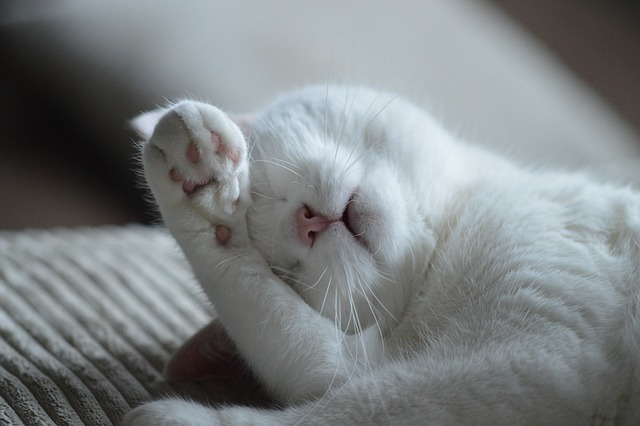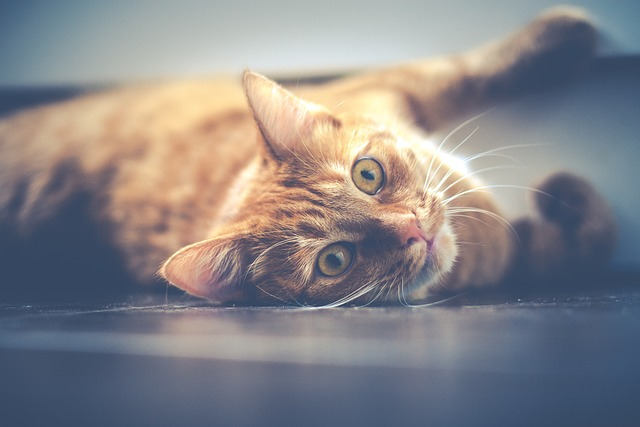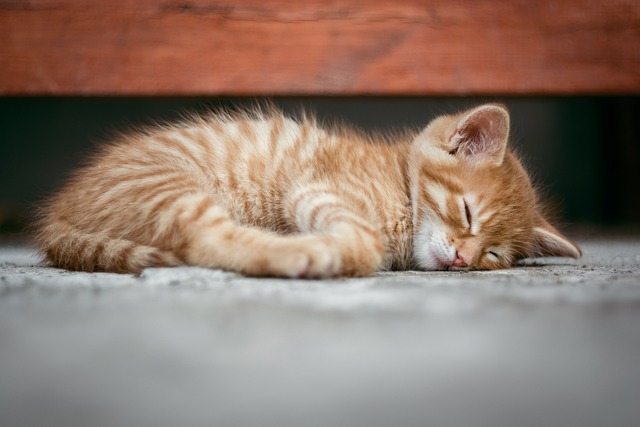
Have you been awakened at an ungodly hour by your cat being unhinged in the house? Well, you are not alone. Many cat owners suffer from these problems and seek answers.
Luckily for you, this article has all the answers to your questions (and your prayers). In this article, we'll explore some of the reasons why your cat wakes up at night. For that, we will provide some helpful tips and tricks so that you and your cat both get to sleep at night.
So, grab a cup of hot coffee or tea, and let's explore why your feline friends refuse to hit the snooze button at night.
6 Reasons Why Your Cat May Not Be Sleeping At Night

Here are 6 reasons why your cat is refusing to sleep at night:
1) General Crepuscular Cat Behavior
Humans are known to be diurnal creatures, meaning we are naturally wired to be awake during the day and asleep at night.
However, the domestic cats are quite different from us in this regard. Contrary to popular belief, cats are not entirely nocturnal animals. Instead, they fall into a crepuscular category, meaning they are most active during the late evening and early morning hours.
So, while we humans are settling down to be done for the day, our feline friends are just getting started.
This time of day is when cats are most active, engaging in their favorite activities such as playing, grooming, and hunting.
Cats typically sleep for about 18 hours per day, broken up into several naps that last an average of 78 minutes each. They may sleep during the day and in the middle of the night, only to become active right when we try to go to bed and again just before we wake up.
Important Note: This creates a clash between their natural rhythms and our typical human schedules.
However, with patience and understanding, we can accommodate our feline friends' unique sleeping habits and find a middle ground that works for both.
2) Mating Season
Cats that are not neutered or spayed may have another reason for staying up at night. This behavior occurs a few times a year.
When female cats get heated, they release pheromones that attract male cats. So, if you have an unneutered male cat living nearby, he may become restless and yowl throughout the night.
Important Note: During the breeding season, cats that aren't neutered can become quite vocal, disturbing the whole household's good night's sleep. This constant yowling and pacing can cause significant stress for the cat and its owners.
3) Change In Environment
Cats are sensitive creatures that can be easily affected by changes to their home environment. These changes can lead to various emotions, such as anxiety, stress, or excitement, which can cause restlessness through the night.
One common change that could affect your cat is introducing a new person or pet into the household. This can be stressful for cats because they feel their territory is being invaded.
Similarly, new neighbors or animals in the neighborhood can also cause anxiety and stress for your cat, especially if they are territorial.
Moving to a new home can be another significant source of stress for cats, as it involves adjusting to a new environment and new routines. Sometimes little things like changes to the home's furniture or the removal of familiar objects can also cause anxiety and confusion for cats, leading to restlessness at night.
4) Loneliness

Cats are social animals that require companionship and interaction, especially indoor cats from a household with a single cat.
Lonely cats tend to get bored, and, as a result, they try to get your attention. This can disrupt your sleep at night. So you will have to look for ways to keep your cat from being bored.
5) Excess Energy
Cats are also highly energetic animals that require regular physical activity to stay healthy and happy. One common reason your cat may be active at night is that it needs more daily exercise and playtime.
6) Illness
Cats can be affected by various medical conditions that can disrupt their sleep patterns and cause them to be more active at night. Some cats may have a physical injury that causes pain and discomfort, making it difficult to get comfortable enough to sleep.
Other cats may suffer from internal medical disorders, such as kidney disease, cancer, or other illnesses, making it hard to rest properly.
Older cats are particularly susceptible to certain medical conditions that can cause nighttime restlessness.
Important Note: For example, feline cognitive dysfunction (FCD) is a common condition that affects aging cats and can cause disorientation, confusion, and changes in the adult cat's behavior, including increased activity at night. Arthritis pain is another common problem in aged cats, making finding a comfortable sleeping position challenging.
Suppose you suspect that your adult cat may be suffering from a medical condition, causing them to be more active at night. In that case, you must consult with your vet immediately.
They can help diagnose the underlying condition and develop a treatment plan to help your cat manage their symptoms and get the rest they need.
What Can You Do To Help?

Now you know why your cat may be staying up and causing havoc with their nighttime activity. Let's transcend into a more solution-oriented mood and see how you can help.
1) Small Meal At Bedtime
Just like us, cats tend to feel sleepy after eating. Therefore, if you want your furry friend to go to bed at night, try offering them a small meal right before bedtime. This might encourage them to have dinner and settle down for a good night's rest.
Moreover, suppose your cat has a habit of banging on your bedroom door and waking you up early in the morning for food. In that case, consider using an intelligent bowl or an automatic pet food feeder to deliver food at that time. This will help your cat stick to a routine feeding schedule and reduce their likelihood of waking you up.
2) Entertain Your Cat
Cats can become bored when they're home alone all day, making them active and restless at night. To help them settle down in the evening, keeping them engaged and active during the day is essential.
One way to do this is by leaving the TV on for your cat to watch, particularly nature shows, which can be entertaining for them. Additionally, using puzzle toys to feed your cat instead of a regular bowl can help keep them occupied as they work to get their food.
Interactive cat toys and scratching posts also help keep your cat entertained. This may include regular petting and providing them with toys and other mental stimulation. Toys that come in handy include cat ball toys.
By engaging your cat during the day, you can help them settle down at night and establish a healthy routine that benefits you and your feline companion.
As a pet parent, providing them with social fulfilment is essential to ensure their overall well-being. It may be one of the primary reasons your cat may not sleep at night.
One way to provide social fulfilment to your cat's day is to spend time with it by actively listening and paying attention to your cat when it communicates with you. Cats may communicate with you in various ways, from vocalizations to body language. You can understand and fulfill your cat's needs by paying close attention to all these signals.
Additionally, playing or cuddling with your cat or engaging in any other activity with them may fulfill their social needs.
Finally, providing your cat with love and affection is crucial for their social and emotional well-being. By providing your cat with social fulfillment, you can help ensure they are happy, healthy, and sleeping at night.
3) Keep Your Cat Awake
One simple way to help your cat sleep through the night is to keep them from taking long naps in the late afternoon or evening.
They will stay awake if you can keep your cat awake and active during these hours. As a result, they may become tired enough to sleep when it's time for you to go to bed.
Playing games with your cat, such as catching the laser pointer dot, fetch, and feather teasers, can effectively tire them out. The longer you can keep your cat active and engaged, the more likely it will become tired and fall asleep when it's time for bed.
Additionally, avoiding overstimulating your cat before bedtime is essential, as this can make them even more active and restless.
4) Ignore Unnecessary Demands

If your cat constantly wakes you up at night and you respond by getting up to play or give them food, you may be training them to behave this way. For example, if you give in to your cat's demands to play or feed them in the middle of the night, they may associate waking you up with getting what they want.
Ignoring your cat's behavior may be difficult, but breaking the cycle and establishing healthy boundaries is essential.
5) Be Patient
Training most cats to sleep through the night is possible but requires effort and patience. Punishing your cat for its nighttime behavior is ineffective and can harm your relationship with them.
Kittens may need more time to develop healthy sleep habits, and older cats may need support to change their habits. It's important to have mature cats examined by a veterinarian before starting any behavioral modification program, as underlying health issues may be causing the behavior.
6) Get Them Spayed Or Neutered
As mentioned earlier, cats that are not spayed or neutered may seem restless at night during mating season. Having your cats spayed or neutered as soon as possible is recommended to prevent such nighttime behavior. This will help with their behavior and protect them from health problems.
7) Provide Them With A Safe Environment

Providing a safe and comfortable environment is essential to help your cat adjust to changes. This may include creating a quiet and secluded space where your cat can retreat when they feel anxious or stressed.
Additionally, providing your furry friend cat toys and other forms of mental stimulation can help distract them from the changes in their environment.
If the issue continues, it is essential to consult a veterinarian. Medication or behavioral therapy may sometimes be necessary to help your cat manage their anxiety and sleep through the night.
Final Words!

Finally, you know why your cat won't sleep at night and everything you can do to help them and yourself.
One thing to remember in this whole process of fixing your cat's sleep schedule is that, to be a suitable pet parent, you need to set boundaries for your cat. Behavior modification doesn't always have to be harsh, so be patient and kind toward your cat.
So try these tricks and get the good night's sleep you have longed for.


0 comments